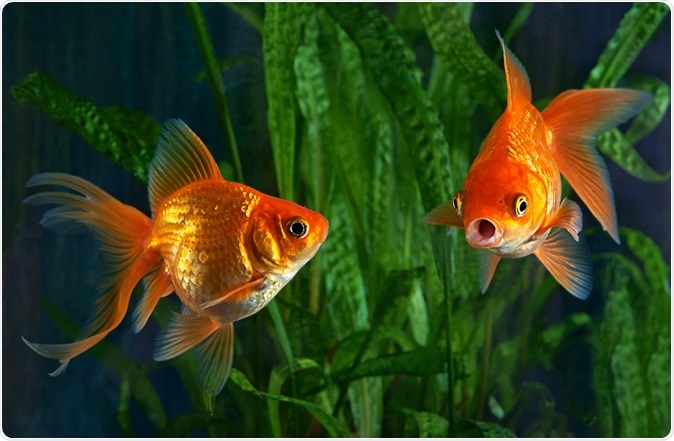A new study has shown that goldfish and similar crucian carps can live up to five months in icy lakes with extremely low or no oxygen. Evolution of the fish has enabled them to develop a set of enzymes that can help the fish convert their carbohydrates into alcohol.

Image Credit: Mirek Kijewski / Shutterstock
This alcohol is then released through the gills of the fish and helps them survive. In almost all other animals carbohydrates if broken down without the help of oxygen, toxic lactic acid builds up in the body.
Lack of oxygen is fatal for humans and all other animals but clearly the crucian carps have found a way around this. That these carps can survive cold winters and frozen lakes, has been known and studied since 1980’s. This is the first study to look at how they are doing it.
The study is published in the journal Scientific Reports last Friday.
Crucian carps live in ponds and lakes in northern Europe and Asia which are frozen during winters. The waterbodies are frozen solid for months before they melt in springs. During this time the fish have to survive without oxygen.
During this time the researchers have found, that the carps and their relatives the goldfish can breakdown carbohydrates without oxygen and instead of toxic lactic acids they produce alcohol.
This alcohol is easier to get rid of or excrete from the bodies compared to lactic acid that tends to accumulate. The fish consequently lose the alcohol via their gills.
Michael Berenbrink from the University of Liverpool in the UK who was part of the team led by Cathrine Fagernes at the University of Oslo, Norway explained how rare this adaptation is among the animals.
The team looked at the carps’ biology to find out how they have achieved this evolutionary miracle.
The study describes how the fish have their special alcohol-production system using the complex and modified enzymes.
These enzymes stimulate the mitochondria within the cells. Mitochondria are rightly called the batteries of the cell as they are the power houses from where the cell obtains ready energy.
The second set of enzymes that these fish have is modified so that they can channelize the carbohydrate breakdown into alcohol much like brewer’s yeast and is called pyruvate decarboxylase.
Fagernes explained that other species of animals would die “long before” the oxygen lack becomes a problem for this unique species of fish.
This study is an in depth and firsthand knowledge of how certain animals can survive “anoxia” or lack of oxygen say experts in the field.
According to the researchers of the team, this adaptation of the animals has evolved 8 million years ago in the common ancestor of carp and goldfish.
The process adapted by these fish is called “whole genome duplication”. Now the fish had two sets of the genes that can help them make a set of parallel enzymes to combat extreme situations.
This adaptation has allowe these carps survive situations where other fishes fail. This means they can best predators as well as competitors.
The fish during the adaptation periods end up with blood alcohol levels of roughly 55 milligrams per 100 millilitres. Berenbrink notes that this is far exceeding the drink-driving limit in some northern European countries. This probably slows down the fish a bit noted Fagernes.
Reference: https://www.nature.com/articles/s41598-017-07385-4